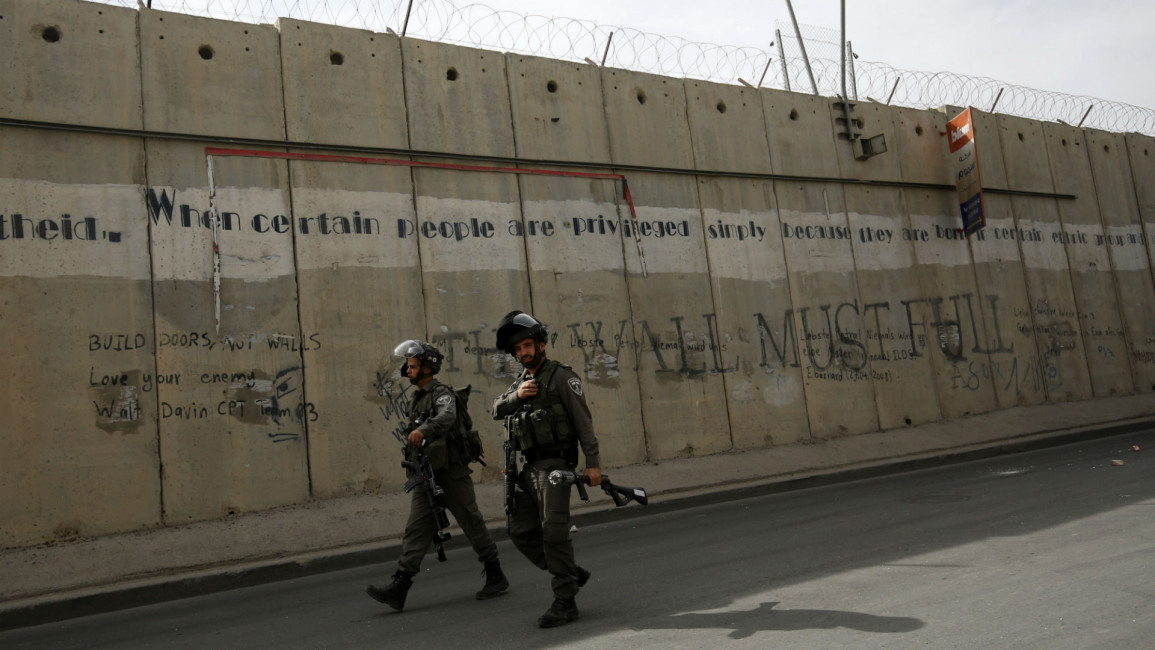
B'Tselem gives up on Israel's justice system
Of all the reports issued by Israeli human rights organisation B'Tselem, the latest publication titled "The Occupation's Figleaf: Israel's military law enforcement system as a whitewash mechanism" is perhaps the most significant publication to date.
After 25 years of reporting Israeli violence against Palestinian civilians to Israel's military courts, the organisation has admitted its complicit role in enabling the settler colonial state to legitimise violence by participating in the futile system which grants impunity to all Israeli perpetrators.
In B'Tselem's own words, the realisation includes specific awareness that "cooperation with the military investigation and enforcement systems has not achieved justice, instead lending legitimacy to the occupation regime and aiding to whitewash it."
As stated in the introduction to the report, B'Tselem states that it has "gradually come to the realisation that the way in which the military law enforcement system functions precludes it from the very outset from achieving justice for the victims". The legal system, it states, conveys a semblance of justice.
Israel's self-serving illusions
As with any other concept that serves to strengthen the foundations of Israel's colonial presence in Palestine, the Israeli military courts have also served to provide a fictional premise of adhering to justice and international law.
Emphasising the purported logic embodied by such institutions provided Israel with further misplaced legitimacy, as Israeli officials lauded the system during times of aggression against Palestinians in order to deflect criticism and accusations of violating international law.
 |
Severe misrepresentation by Israel, the international community and human rights organisations means that violations are documented as isolated incidents |  |
It is only because the international community is willfully complicit in such deception, however, that Israel has been allowed such leniency, effectively giving priority to detailed rhetoric and reports that discuss alleged morality and values rather than the illegality of colonial violence.
Complicity
B'Tselem has referred to Israel's military law enforcement system as having developed "the expectation that human rights organisations, including B'Tselem, serve as subcontractors for the military investigation system: that they submit the complaints, coordinate collecting statements, obtain documents, and so forth."
It is claimed that adhering to such a system was based upon "hope" that justice would be brought to Palestinian victims of Israeli oppression. Given the ephemeral nature of hope, it is difficult to envisage how, despite increasing evidence regarding the complicity discussed by B'Tselem, the organisation still failed to provide an alternative for a quarter of a century.
While refusal to comply with the system is welcomed, it is hard to envisage a sliver of authenticity in the claims that such previous dealings would have ever had the power to change anything on the ground.
The missing link
Palestine is a prime example of living history - the consequences of colonisation, ethnic cleansing, forced displacement, military occupation and settler violence have ensured a cycle in which deprivation of territory and freedom have fed the pull of collective memory. One would therefore expect such a tenacious hold to manifest itself when dealing with daily violence suffered by Palestinians.
Yet, the opposite is usually the case. Severe misrepresentation by Israel, the international community and human rights organisations means that violations are documented as isolated incidents. This applies to both the current circumstances but also the colonial past, and has fomented perpetual aggression; as if history should be relegated to the confines of academia and its ramifications obliterated to produce a new, distorted narrative.
B'Tselem has, 25 years later, painstakingly explained the process of military court deception and the complicity of human rights organisations. This action, however, should not pass without scrutiny. While much detailed research has always featured in the organisation's reports, one might ask why B'Tselem has delayed its recognition of evidence that reporting to military authorities only served to provide fodder for Israel's schemes.
 |
Justice for Palestinians has been rendered obsolete since the initial stages of Zionist colonisation |  |
It is inconceivable that the organisation needed to come to a gradual realisation, after all, it is part of Israeli society and therefore fully aware of violations against Palestinian civilians.
Given the organisation's work, a few years of analysis, not to mention a thorough reading of Palestinian history and Israeli colonial violence would have provided enough evidence for immediate realisation that complying with the legal institutions in Israel is tantamount to complicity.
Justice for Palestinians has been rendered obsolete since the initial stages of Zionist colonisation. Following B'Tselem's declaration, a follow-up with suitable, uncompromising alternatives in favour of Palestinians would be the next step in ensuring this latest report will not be confined to mere research purposes.
Ramona Wadi is an independent researcher, freelance journalist, book reviewer and blogger specialising in the struggle for memory in Chile and Palestine, colonial violence and the manipulation of international law. Follow her on Twitter: @walzerscent
Opinions expressed in this article remain those of the author and do not necessarily represent those of The New Arab, its editorial board or staff.



